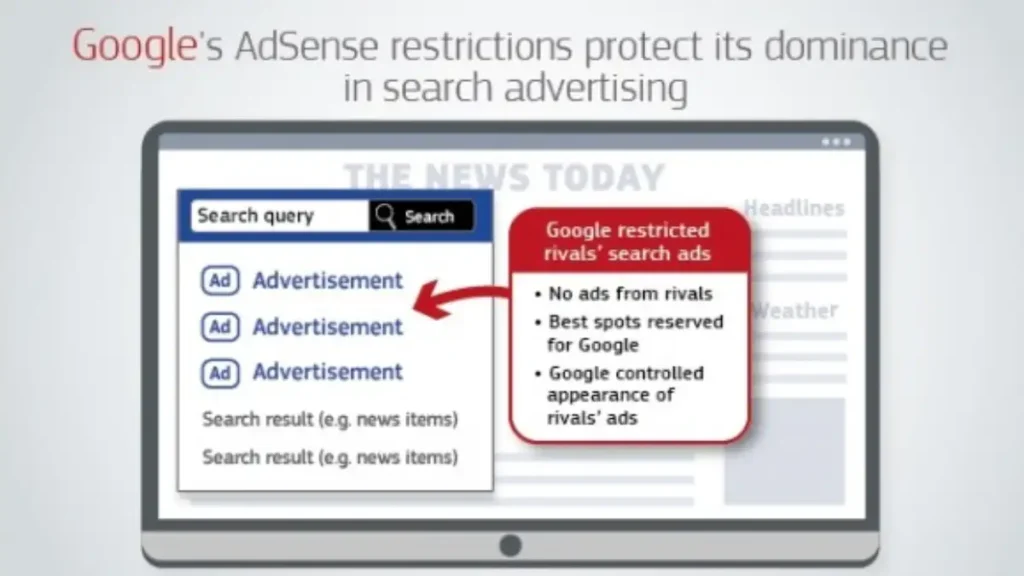In a major legal win for the tech giant, Google successfully overturned the €1.5 billion fine imposed by the European Union in 2019. The penalty, issued for antitrust violations related to Google’s AdSense service, has been annulled by the EU’s General Court. This decision marks a significant victory for Google in its ongoing battle against the EU’s regulatory actions.
Background: EU’s 2019 Fine for Antitrust Violations
What Was Google Penalized For?
The original fine was levied after the European Commission found that Google was using restrictive clauses in contracts with AdSense partners between 2006 and 2016. These clauses allegedly “cemented” Google’s dominant position in the online search advertising market, limiting competition and breaching EU competition rules.

AdSense for Search allows websites to embed a Google search box, enabling them to earn a commission from ad revenue. The Commission argued that Google’s terms prevented third-party websites from displaying ads from other search engines, leading to unfair competition.
Fine Amount and Significance
The penalty of €1.5 billion ($1.7 billion at today’s exchange rate) represented 1.29% of Google’s total revenue in 2018, a major financial blow at the time. However, this was only one of several fines that the company has faced from the EU over the years, making this recent appeal victory even more significant.
Google’s Appeal: A Legal Win Against the EU
General Court Overturns Fine
Google’s appeal against the fine was heard by the EU’s General Court, which ruled in favor of the tech giant, overturning the €1.5 billion penalty. The court found that the European Commission had failed to prove that Google’s actions significantly impacted competition in the market, leading to the annulment of the fine.
This decision could have wider implications for future antitrust cases against tech giants in Europe, as it raises questions about how competition law is applied in the digital economy.
EU’s Response: Will They Appeal?
While the fine has been overturned, the European Union still has the option to challenge the ruling. The case could be taken to the Court of Justice of the European Union (CJEU), the highest court in the bloc. However, the EU has yet to confirm whether it will proceed with this option. If they choose to appeal, the case could drag on for several more years, further complicating the regulatory landscape for Google.
Other Fines Google Has Faced: A Mixed Record
2017 Fine for Google Shopping Abuse
While Google’s recent legal victory overturned the AdSense-related fine, the company did not succeed in appealing an earlier penalty. In 2017, the European Commission fined Google €2.42 billion for abusing its dominant position by favoring its own comparison shopping service in search results. This fine remains intact despite Google’s efforts to challenge it.
2018 Fine for Android Practices
Similarly, Google was fined a massive €4.3 billion in 2018 for imposing restrictive terms on Android device manufacturers. The Commission argued that Google forced manufacturers to pre-install Google Chrome and the Google Play Store, preventing competition from other browsers and app stores. This fine has also not been overturned, demonstrating the complexity of Google’s legal battles in Europe.
Qualcomm Also Fined by EU in Separate Ruling
Qualcomm’s €242 Million Fine Upheld
In a related case, the EU’s General Court upheld a €242 million fine against Qualcomm. The US chipmaker was found guilty of using predatory pricing tactics to push competitors out of the market for baseband chips, which are used in mobile devices to manage communications with cellular networks. Although Qualcomm succeeded in reducing the fine slightly, the court upheld the core findings of the Commission, and the company is still required to pay.
Qualcomm’s Role in the Broader EU Tech Crackdown
Like Google, Qualcomm has faced intense scrutiny from European regulators. The Qualcomm ruling reaffirms the EU’s commitment to curbing anti-competitive practices among major US tech companies, even as the legal frameworks for such penalties continue to evolve.
Implications of the Google Ruling: What’s Next for Big Tech in Europe?
Legal Precedents and Future Antitrust Actions
Google’s victory could set an important legal precedent for other companies facing similar antitrust allegations in Europe. The ruling may prompt the European Commission to rethink its approach to competition cases in the digital space, particularly when it comes to proving harm to consumers and competitors.
Increased Scrutiny on Tech Giants
Despite this setback for the EU, the regulatory environment for Big Tech in Europe remains hostile. The European Commission has made it clear that it will continue to pursue antitrust cases against Google and other major players. The Digital Markets Act, set to take effect soon, is expected to further tighten the rules on how tech giants operate within the EU, potentially leading to more fines and legal battles.
Conclusion: A Temporary Reprieve for Google?
While Google’s successful appeal represents a significant victory, the company’s legal troubles in Europe are far from over. The European Union may still appeal the ruling, and Google continues to face pressure from other regulatory bodies, not just in the EU but around the world.
As the battle between Big Tech and regulators intensifies, this case highlights the ongoing challenges of applying traditional competition law to the fast-evolving digital economy. For now, Google can celebrate a win, but the road ahead remains uncertain.


